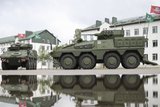Turkey to receive Russian S-400 missiles in July 2019
Turkey and Russia have agreed to bring forward to July 2019 the delivery of S-400 air defence missile systems to Ankara, a Turkish official said, in a purchase that has raised eyebrows among NATO allies.
Ismail Demir, Turkish Defence Industries Undersecretary, wrote on Twitter late on 3 April: ‘We brought forward the delivery date in the contract signed with Russia for the acquisition of S-400 systems and got an earlier date of July 2019.’
His announcement came after Russian President Vladimir Putin held several hours of meeting with Turkish counterpart Recep Tayyip Erdogan in Ankara.
At the press conference, Putin said he and Erdogan had decided to ‘speed up’ the delivery of the S-400 air defence missile systems to Ankara, without providing a precise date.
Russian officials had said in December 2017 that the first deliveries in the $2 billion deal were likely to begin at the end of 2019 or beginning of 2020.
Putin and Erdogan have forged an increasingly close alliance in recent months, from burgeoning energy ties to holding talks to end the Syria crisis.
In a sign of the importance of the partnership, Putin's visit to Turkey is his first trip abroad since he won a historic fourth presidential mandate in 18 March polls.
Erdogan said on 3 April that Turkey was in no mood to listen to criticism from the West over the purchase of the S-400 systems, saying ‘this issue is now closed’.
According to Russian press reports, Turkey has been interested in a technology transfer and even joint production of the S-400 with Russia, a prospect that has been resisted by some in the Moscow security services.
Putin refused to discuss the issue saying ‘these are exclusively commercial questions’ rather than political ones.
Related Equipment in Defence Insight
More from Land Warfare
-
Germany signs multi-billion-dollar deals for 6x6 CAVS and GDELS Eagle vehicles
The order is a further boost for the Common Armoured Vehicles System programme which has notched notable successes in the past 12 months. The first vehicle, made in Finland, will be delivered next year with local production expected to ramp up in 2027.
-
![Rheinmetall and KNDS tank tie-up narrows trans-European options]()
Rheinmetall and KNDS tank tie-up narrows trans-European options
The French and German governments signed an agreement in June 2018 to cooperate on the development of a new main battle tank under the Main Ground Combat System programme but the effort has struggled. This new agreement may damage it further.
-
![Hungary set to begin using Hero 400 loitering munitions]()
Hungary set to begin using Hero 400 loitering munitions
Developed by Israel's Uvision and with systems being sold in the thousands to multiple European NATO countries and the US, the Hero family of loitering systems is also in production in the US and Italy, the latter through Rheinmetall.
-
![Croatia orders Leopards and CAESAR howitzers as Lithuania orders more CAESARs]()
Croatia orders Leopards and CAESAR howitzers as Lithuania orders more CAESARs
The Leopard is becoming the tank of choice in central and eastern Europe as Croatia joins Lithuania, the Czech Republic and Hungary in ordering the platform. Lithuania and Croatia have also signed for CAESAR howitzers.
-
![Light Reconnaissance Strike – enabling a vital mission set (Studio)]()
Light Reconnaissance Strike – enabling a vital mission set (Studio)
A new system-of-systems concept will unlock digital integration of sensors and weapons for Light Forces, allowing them to shape the battlefield environment on their own terms and upgrade legacy platforms.
























